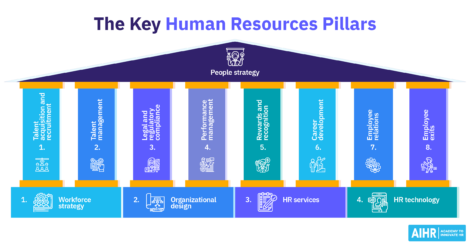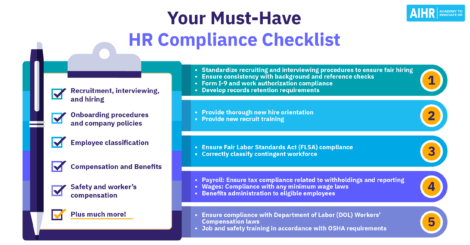23 Human Resources Director Interview Questions To Prepare For

The HR Director plays a pivotal role in the world of Human Resources. They shape an organization’s workforce, ensure compliance with employment laws, and foster a positive workplace culture. When it comes to landing the role of HR Director, it goes without saying that acing the interview is essential.
To help you navigate this critical step in your career, this article will provide insights into what you can expect during an HR Director interview. We will also highlight the key skills you should possess and provide 23 interview questions you might be asked.
Contents
What to expect in an HR Director interview
Key competencies of an HR Director
23 Interview questions for a Human Resources Director
– Behavioral questions
– Strategic questions
– Technical and industry-specific questions
– Leadership and management skills
– Crisis management and problem-solving
– Cultural fit and organizational values
– Scenario-based questions
What to expect in an HR Director interview
Get ready. The interview for the role of HR Director will be comprehensive. Interviewers will be looking to assess your abilities, experience, and cultural fit for their organization. Here’s a breakdown of what you could expect:
- Initial interview: The initial interview is also a screening interview, often held with an HR representative to understand your general qualifications, motivation for the role and whether you might be a good fit for the organization.
- First interview: Once you make it through the initial screening round, you might be invited to a first interview. There are several types of questions you can expect during this stage:
- Behavioral questions: Be ready to discuss your past behaviors and how they relate to your potential performance as an HR Director.
- Strategic questions/strategic thinking: Expect questions aimed at understanding your strategic vision for HR in the organization.
- Technical and industry-specific questions: You’ll likely be tested on your industry knowledge and familiarity with HR tools and practices.
- Leadership and management skills: Interviewers will want to understand what your leadership style is and how you effectively lead an HR team and manage HR functions.
- Crisis management and problem-solving: HR Directors often handle difficult situations; be prepared to share your approach to crisis management.
- Cultural fit and organizational values: Your interviewers will want to know if you align with their values.
- Scenario-based questions: These test your ability to handle real-life HR situations.
- Presentation or case study: You might be asked to present a case study or demonstrate your problem-solving skills in action.
- Follow-up interviews: Multiple interviews may be necessary to thoroughly evaluate your qualifications.
- Assessments: Some organizations use psychometric or skills assessments.
- Reference checks: Expect that your professional history will be scrutinized.
- Offer negotiation: If you impress them, the next step would involve discussing terms.
Key competencies of an HR Director
As an HR Director, you should possess a diverse skill set that encompasses the following:
- Analytics translation
- Builds trust
- Business advisory/partnering/generalist
- Co-creates strategy
- DEIB, employee experience and culture
- Develops and coaches
- Results-driven
- Employee health
- Employee relations and labor
- Engages people
- Inspires and motivates
- Interprets context
- L&D/Leadership development
- Leads with empathy
- Manages conflict
- Organizational development and design
- Safety and wellbeing
- Sets direction
- Talent and performance management.

23 Interview questions for a Human Resources Director
Behavioral questions
1. Tell me about a time you resolved a complex employee dispute
In this response, you should narrate a specific situation where you resolved a complex employee dispute. Explain the steps you took, such as mediation, conflict resolution techniques, and communication strategies. Emphasize the positive outcome, highlighting how your actions led to a harmonious workplace.
2. Describe a situation where you successfully managed a difficult termination process
Describe a challenging termination scenario you encountered, such as a sensitive layoff or a firing for misconduct. Discuss your approach, such as maintaining empathy and professionalism, ensuring compliance with employment laws, and offering support to the affected employee. The ideal response should focus on your ability to handle difficult situations with fairness and respect.
3. How have you contributed to improving employee retention in your previous roles?
Share an example of a time when you implemented strategies or programs to enhance employee retention. This might include initiatives like professional development, improved benefits, or engagement programs. The response should highlight your impact on employee satisfaction and long-term retention.
4. Can you share an example of a time when you had to lead HR through a significant change?
Discuss a specific instance where you spearheaded HR efforts during a major organizational change, such as a merger or restructuring. Emphasize your role in, for instance, ensuring a smooth transition for employees, maintaining communication, and managing resistance to change. This response should showcase your change management and leadership skills.
5. Tell me about your experience in implementing diversity and inclusion initiatives
Provide an example of a time you actively promoted DEIB in the workplace. This could involve creating diversity training programs, implementing inclusive hiring practices, or addressing diversity-related issues. Discuss the positive outcomes of these initiatives, demonstrating your commitment to fostering an inclusive work environment.
6. Describe a situation in which you had to handle a high-stakes HR compliance issue
In this response, you should recount a specific situation where you encountered a critical HR compliance challenge, such as an audit or a legal issue. Explain the steps you took to ensure compliance, your knowledge of relevant employment laws, and how you resolved the issue professionally. This response should highlight your expertise in compliance and ethical decision-making.
Strategic questions
7. What is your vision for the HR department in our organization?
Provide a clear and compelling vision for the HR department that aligns with the organization’s long-term objectives. Discuss strategic initiatives, employee development plans, and how HR can support the company’s growth and success.
8. How do you stay updated on the latest HR trends and technologies?
In this response, explain your methods for staying current in the field, such as attending conferences, reading industry publications, and networking. You should emphasize the importance of continuous learning and adapting HR practices to evolving trends and technologies.
9. What role should HR play in achieving our company’s long-term objectives?
Articulate a clear and well-considered perspective on HR’s role in the organization’s success. You should also discuss HR’s contribution to talent acquisition, employee development, and creating a positive workplace culture that supports the company’s long-term goals.
10. Can you share an example of how you used HR data to drive strategic decision-making?
Provide a concrete example of a situation where you leveraged HR data to make a significant strategic decision. Discuss the specific data sources, analysis, and the positive impact the decision had on the organization’s success.
Technical and industry-specific questions
11. How familiar are you with our industry and its specific HR challenges?
Demonstrate your industry knowledge by discussing specific challenges and trends relevant to the organization’s sector. In your response, you should emphasize your adaptability to industry-specific needs and the transferability of your HR expertise.
12. Which HR software and tools are you proficient with, and how have they benefited your previous employers?
List HR software and tools that you are proficient with and provide examples of how these tools improved HR processes, such as recruitment, performance management, or data analytics. Your response should highlight your ability to leverage technology for enhanced HR efficiency.
13. How do you ensure compliance with labor laws and regulations in your HR practices?
Explain your approach to ensuring compliance, including regular audits, training, and staying updated on changes in labor laws. You should also emphasize your commitment to ethical HR practices and legal compliance.
Leadership and management skills
14. Tell me about a time when you successfully built and led a high-performing HR team
Share a specific example of how you formed a high-performing HR team, highlighting your recruitment, development, and leadership skills. Also, emphasize the team’s accomplishments and positive contributions to the organization.
15. How do you motivate and engage your HR staff to perform at their best?
Discuss your approach to motivating and engaging HR staff, which may include setting clear expectations, providing opportunities for professional growth, and recognizing outstanding performance. Highlight how motivated and engaged teams contribute to HR success.
16. Describe your approach to succession planning within the HR department
In this response, you should explain your strategy for succession planning in HR, and ensure that the department has a pool of talented individuals ready to fill key roles. Discuss the identification and development of potential successors and how this contributes to HR department stability.
Crisis management and problem-solving
17. Can you provide an example of a crisis situation you handled within HR, and how you managed it?
Explain a specific HR crisis that you managed, such as a major employee relations issue or a public relations challenge. Discuss the steps you took to address the crisis, your communication strategies, and the positive resolution that you may have achieved. This response should showcase your crisis management skills and ability to stay composed under pressure.
18. How do you approach and resolve HR issues that involve legal matters?
Explain your approach to HR issues involving legal matters, emphasizing your knowledge of employment laws and ethical decision-making. Give an example of how you addressed a legal HR challenge to ensure compliance while also protecting the organization’s interests.
Cultural fit and organizational values
19. How do you plan to uphold our company’s values within the HR department?
In your response, describe your approach to aligning HR practices with the company’s values. Discuss strategies for promoting and reinforcing these values throughout the HR department and the organization.
20. How would you promote diversity, equity, inclusion and belonging within our organization?
Outline your strategy for promoting diversity and inclusion within the organization, including initiatives like inclusive hiring practices, diversity training, and awareness campaigns. Also, emphasize your commitment to creating an inclusive work environment that reflects the organization’s values.
Scenario-based questions
21. Given a hypothetical situation of a workforce reduction, how would you handle it while maintaining employee morale?
Provide a comprehensive plan for handling a workforce reduction scenario that balances business needs with employee morale. In your response, discuss communication strategies, support mechanisms, and initiatives to mitigate the impact on remaining employees.
22. Imagine a conflict between two high-performing employees. How would you address it without impacting their productivity?
Outline a conflict resolution strategy that preserves the productivity of both employees. Here, emphasize the importance of open communication, mediation, and finding common ground to resolve the conflict while maintaining a positive working relationship.
23. In a merger or acquisition scenario, how would you integrate HR practices and cultures from two different organizations?
Provide a detailed plan for integrating HR practices and cultures in a merger or acquisition. Discuss steps you would take, such as a cultural assessment, communication strategies, and gradual integration to ensure a smooth transition and alignment with the organization’s values and objectives.
Key takeaway
Acing an HR Director interview requires showcasing a combination of behavioral, strategic, technical, and leadership skills. By providing specific and detailed responses to these interview questions, you can demonstrate your ability to handle complex HR scenarios, align with the organization’s vision, stay updated on industry trends, and maintain a strong focus on cultural fit and values.
Preparing for these questions will position you for success in securing the role of HR Director and making a positive impact in your new position.
Weekly update
Stay up-to-date with the latest news, trends, and resources in HR
Learn more
Related articles
Are you ready for the future of HR?
Learn modern and relevant HR skills, online










